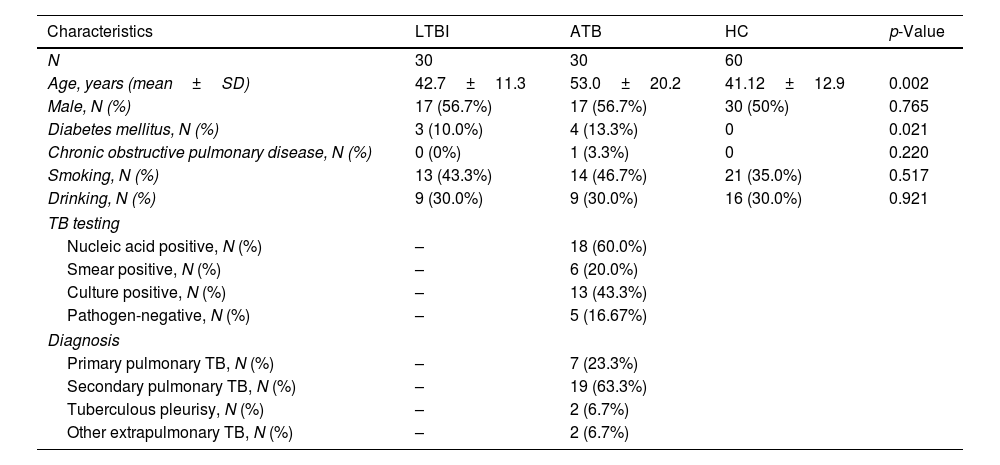Tuberculosis (TB) remains a significant global health threat, with latent tuberculosis infection (LTBI) serving as a major reservoir for new TB cases. This study aimed to identify antigens capable of distinguishing between active tuberculosis (ATB) and LTBI in interferon-γ release assays (IGRA).
MethodsFour candidate antigens for LTBI and two for ATB were selected based on a literature review. These antigens were synthesized genetically, subcloned, expressed in bacteria, and purified. Clinical samples were collected from individuals diagnosed with ATB and LTBI to aid in assay development. Novel IGRA assays were then developed using these antigens, and their discriminatory efficacy was assessed.
ResultsAmong the six candidate antigens tested, only three (Rv2028c, Rv2029c and Rv0475) showed promising discriminatory potential for LTBI. Particularly, Rv0475 (HBHA), expressed in Escherichia coli without methylation, exhibited greater stimulation activity in LTBI compared to ATB. Individually, these antigens demonstrated sensitivities ranging from 72.4% to 93.3% and specificities ranging from 79.3% to 89.7%. The combined stimulation of multiple antigens can improve the sensitivity and specificity of the diagnosis.
ConclusionOur findings highlight the potential of three LTBI antigens and their combination in distinguishing between ATB and LTBI. Adding this antigen combination to the traditional IGRA assay could significantly improve the clinical differentiation of healthy individuals, LTBI, and ATB. Further investigation in larger and more diverse patient cohorts is warranted to validate the utility of these antigen combinations in clinical settings.
La tuberculosis (TB) sigue siendo una amenaza significativa para la salud global, y la infección tuberculosa latente (LTBI) sirve como un reservorio importante para nuevos casos de TB. Este estudio tuvo como objetivo identificar antígenos capaces de distinguir entre tuberculosis activa (ATB) e LTBI en ensayos de liberación de interferón-γ (IGRA).
MétodosSe seleccionaron 4 antígenos candidatos para LTBI y 2 para ATB basados en una revisión de la literatura. Estos antígenos fueron sintetizados genéticamente, subclonados, expresados en bacterias y purificados. Se recogieron muestras clínicas de individuos diagnosticados con ATB y LTBI para el desarrollo del ensayo. Posteriormente se desarrollaron nuevos ensayos IGRA utilizando estos antígenos, y se evaluó su eficacia discriminatoria.
ResultadosEntre los 5 antígenos candidatos probados, solo 3 (Rv2028c, Rv2029c y Rv0475) mostraron un potencial discriminatorio prometedor para LTBI. En particular, Rv0475 (HBHA), expresado en Escherichia coli sin metilación, exhibió una mayor actividad de estimulación en la LTBI en comparación con la ATB. Individualmente, estos antígenos demostraron sensibilidades entre el 72,4 y el 93,3%, y especificidades entre el 79,3 y el 89,7%. La estimulación combinada de múltiples antígenos puede mejorar la sensibilidad y la especificidad del diagnóstico.
ConclusionesNuestros hallazgos destacan el potencial de 3 antígenos de la LTBI y su combinación para distinguir entre ATB y LTBI. Añadir esta combinación de antígenos al ensayo IGRA tradicional podría mejorar significativamente la diferenciación clínica entre individuos sanos, LTBI y ATB. Se requiere una investigación adicional en mayores y más diversas cohortes de pacientes para validar la utilidad de estas combinaciones de antígenos en entornos clínicos.
Article
Socio de la Sociedad Española de Enfermedades Infecciosas y Microbiología Clínica

Para acceder a la revista
Es necesario que lo haga desde la zona privada de la web de la SEIMC, clique aquí













